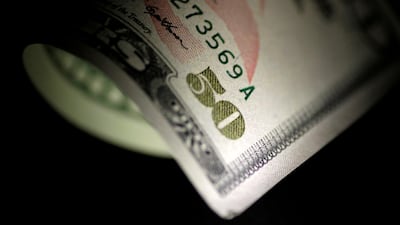Dollar weakness is the most surprising feature of financial markets so far in 2018. It is surprising because it is happening at a time when the dollar was generally expected to be stronger in view of widespread assumptions that interest rates in the United States are headed higher. But in this instance, projections of higher interest rates are now being "Trumped" by broader concerns that the US administration's attitude towards free trade, and ultimately towards the dollar itself, are changing.
The dollar index is down more than 13.5 per cent since the start of 2017, and 3.5 per cent this month alone, reaching its lowest level in three years after Treasury Secretary Steven Mnuchin signalled that a weaker US dollar would be good for the US economy, and as concerns about US protectionism increased.
Under normal circumstances, the rise in US Treasury yields currently under way should be supportive of the dollar, especially at a time when the outlook for monetary policy elsewhere in the world is much less certain. US two-year yields breached 2 per cent in early January, the highest levels they have reached since 2008, and 10-year yields appear to be eyeing a re-test of 3 per cent, a level not seen since late 2013. And even though markets are beginning to gain more confidence as other central banks, in the eurozone, the United Kingdom and Japan are positioning themselves to tighten monetary policy as well, this does not reverse the widening interest rate differentials that are still very much in the dollar's favour.
_______________
Read more:
Foreign exchange rates react to Mnuchin, Hammond comments on dollar, pound
US dollar weakness to continue due to political gridlock
_______________
Last year, dollar weakness was often rationalised by doubts about whether the Fed would actually deliver the three rate hikes projected by its own forecasts, as well as by uncertainty about whether tax reforms would ever get passed. But with both the Fed and the White House finally delivering on these policies last year, these explanations do not seem to hold water fortoday. More likely the real focus was on the negative implications of those tax cuts for the US's twin deficits, in particular the fiscal one.
Another element that has not changed much from the last year to this one is the perception of political uncertainty in Washington DC, an ever present concern almost since Donald Trump's inauguration in January 2017. This began to gain ground in May after former FBI Director James Comey was fired by Mr Trump and the Mueller enquiry into Russian collusion was launched, with the dollar's decline being a more or less a consistent feature since then. Even so, its depreciation in 2017 was relatively gradual and contained, which was perhaps surprising in view of the protectionist rhetoric of Mr Trump's election campaign.
However, 2018 has begun with intensified political noise around the Trump White House which has already seen real consequences with the brief closure of the US government. The perception of policy drift is also growing, while the Mueller enquiry is increasingly being seen as an existential threat to the Trump presidency. Into this uncertainty, the White House has reopened the sensitive issue of trade policy and protectionism, as the North American Free Trade Agreement negotiations resumed.
Separately, Mr Trump announced new import tariffs on solar panels and washing machines that will largely affect Asian exporters.
President Trump reiterated his "America first" agenda during his speech at the World Economic Forum in Davos, while Treasury Secretary Mnuchin was also explicit about the benefits of a weak dollar.
Although Mr Trump subsequently rowed back on Mr Mnuchin’s remarks following ECB criticism, the perception remains that a policy shift is underway.
In hindsight, it was probably only likely to be a matter of time before the dollar began to be affected by Mr Trump’s mixed messages on trade and by White House dysfunction. Following the Plaza accord dollar devaluation in the mid-1980s, the markets became accustomed in the 1990’s to US Treasury Secretaries’ articulation of strong dollar policies. This approach is clearly over, and may even have reversed, and in a chaotic political environment in Washington, it may take a lot more than the Fed’s projected rate hikes to rein the dollar back in.
Tim Fox is chief economist and head of research at Emirates NBD


